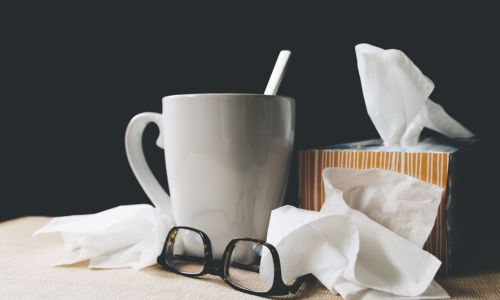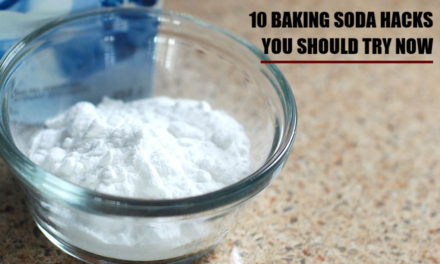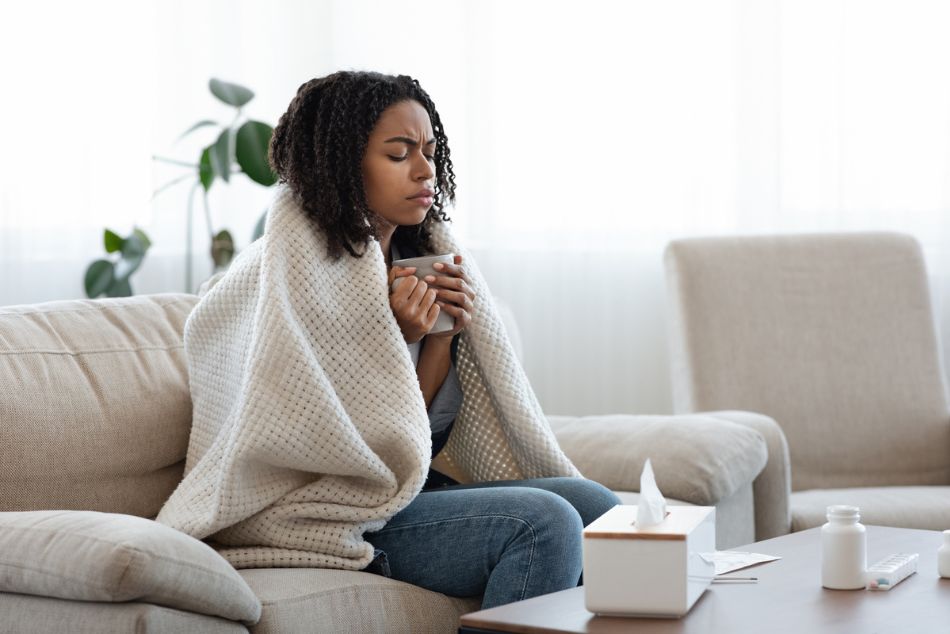In this post: How do you handle self care when sick? Whenever you experience some physical or even mental discomfort to the point where you’re unable to fulfill your work obligations you need time to take care of yourself and prioritize health and wellbeing when you’re feeling unwell.
The early morning sunlight struggled to seep through the thick curtains.
I lay in bed, tangled in the sheets, feeling weak and exhausted. My throat was sore, my head was pounding, and my body was aching all over.
I tried to get up, but as soon as I sat up, I felt dizzy and nauseous. I knew I couldn’t make it to work today.
I have a deadline to meet, a meeting with my manager, and a project to finish. But my body was failing me, and I knew I couldn’t push through it.
I reluctantly reached for my phone and dialed the number of my workplace.
Getting sick is no fun and no one enjoys being sick, but it’s an unavoidable part of life.
When sickness hits, it can take a toll on your mental and physical well-being. It throws your whole routine off track and makes you feel miserable.
Sometimes it feels like there’s nothing you can do other than wait it out, but there are things you can do to take care of yourself and feel better.
Table of Contents
Is It Bad To Lay In Bed All Day When Sick?

When you’re feeling sick, it’s common to want to stay in bed all day to rest and recuperate. It’s not necessarily “bad” to lay in bed all day when you’re sick, but there are some factors to consider.
First, if you’re just experiencing mild symptoms like a runny nose or a sore throat, laying in bed all day may not be necessary or helpful. In fact, getting up and moving around a bit can actually help you in this case.
On the other hand, if you’re experiencing more severe symptoms like fever, body aches, or extreme fatigue, staying in bed and resting is definitely a good idea.
Your body needs rest to fight off illness, and pushing yourself too hard can make your symptoms worse and prolong your recovery time.
The key is to listen to your body and take things easy when you’re feeling sick. If you need to stay in bed all day to recover, that’s okay. Just make sure you’re taking steps to care for yourself and support your immune system.
Strategies For Self Care When Sick

Overall, taking care of yourself when you’re sick means paying attention to your body’s needs and avoiding activities that could make you feel worse.
There are many ways to take care of yourself when you’re feeling under the weather. Eating healthy foods, taking care of your symptoms, practicing self-care, and getting plenty of rest are all important for your overall health and well-being.
Let’s go over some self-care tips for when you’re feeling sick.
1. Rest And Relaxation
When you’re sick, it’s important to give your body time to rest and recover. Take one or two days off work and cancel plans that aren’t essential.
Make sure to get plenty of rest. This doesn’t mean just sleeping but it’s important to take breaks throughout the day and allow your body some time to recover.
Get up and move around occasionally, take a short walk if you can, or stretch throughout the day. Don’t beat yourself up for not being productive because your body needs this time to heal. so allow your body to recharge.
It’s natural to want to return to your daily routine as soon as possible, but doing so could make your recovery much slower. Reading a book, watching a movie, or taking an afternoon nap can go a long way in reducing stress and promoting relaxation.
2. Stay Hydrated
One of the most important things to do when you’re sick is to drink plenty of water. It’s essential to drink fluids throughout the day, especially if you have a fever.
Staying hydrated helps to flush out toxins in your system, keeping your body functioning properly. Water and electrolyte drinks are all good options.
Don’t forget about other liquids like tea, soup, and broth, which can also help to soothe a sore throat or congestion.
Try to avoid sugary drinks and alcohol, which can dehydrate you further. If you’re having trouble keeping anything down, ice chips or popsicles can help keep you hydrated.
3. Eat Nourishing Foods
Food can play a big role in helping you feel better when you’re sick. While you may crave junk food or comfort foods, they don’t offer your body the nutritional support needed to fight off sickness.
So try to eat foods that are easy to digest and packed with nutrients. Chicken soup, bone broth, and smoothies are all good options.
Avoid foods that are high in sugar, fat, or processed ingredients, which can make you feel worse.
When you consume nutrient-rich foods, including fruits, vegetables, whole grains, and lean meats, they can help to enhance your immune system and speed up your healing process.
4. Take Care Of Your Symptoms

Depending on what you’re sick with, you may have different symptoms that you need to take care of. For example, if you have a fever, take acetaminophen or ibuprofen to bring it down.
If you have a sore throat, try gargling with salt water. Over-the-counter cold and flu medications can also help relieve symptoms, but be sure to read the labels and follow the recommended dosages.
5. Practice Self Care
Being sick can be stressful and overwhelming, so make sure to take care of your mental health as well. Take a warm bath, meditate, or read a book to help you relax.
During these times, it’s important to practice good hygiene to prevent the spread of germs to others.
Wash your hands frequently using soap and water or hand sanitizer, cover your mouth when sneezing, and use a tissue when you have a cough.
Preventing the spread of an illness is not only beneficial to you but also to those around you.
6. Get Some Sunshine
Vitamin D is essential for a healthy immune system, so try to get some sun or take a supplement if the weather isn’t cooperating.
Even if you can’t go outside, you can still benefit from light therapy by sitting next to a sunny window. And, don’t forget to put on your sunscreen.
Soaking up some sun can help your body fight off infection and illness more quickly.
7. Take A Gentle Walk
While it’s important to rest when you’re sick, that doesn’t mean that you shouldn’t move at all.
If your energy level allows, taking a short walk outside can be rejuvenating. The fresh air can uplift your spirit, promote a sense of calm and speed up the healing process.
Walking in nature is especially beneficial as it helps reduce stress hormones. And, can even increase white blood cells which are responsible for fighting off infection.
8. Get Plenty Of Sleep

Your body needs sleep to recover and fight illness, so make sure to get plenty of rest when you’re sick.
Go to bed earlier than usual and take naps during the day if needed. Avoid using screens at least an hour before bedtime as this can decrease your quality of sleep.
Getting adequate rest is important for healing and will help you feel better faster.
9. Take a Break from Your Phone
Limit your exposure to social media, news, and other digital distractions. Constantly checking your phone can be stressful and can distract you from the important task of taking care of yourself.
Take a break from all forms of technology while you’re sick, including social media and emails.
This will give you more time to focus on getting better and help reduce stress and anxiety.
10. Use A Diffuser
Harness the power of soothing scents by using essential oils. These can help to reduce stress, improve sleep, and boost the immune system. Fill a diffuser with your favorite scent and let it run while you’re sleeping or resting.
This will help to relax your body and mind so that you can get some much-needed rest.
Using a diffuser can also help purify the air in your home, reducing the risk of getting sick.
By taking the time to look after yourself when you’re sick, you can help to enhance your immune system and speed up the healing process. So take it easy, give yourself some TLC, and get back on your feet in no time.
11. Take Your Vitamin C
Taking Vitamin C helps to boost the immune system, which can help you feel better faster.
You can take vitamin C in supplement form or get it from foods such as oranges, grapefruit, bell peppers and spinach.
This is a powerful antioxidant and it’s also anti-inflammatory, so it can help reduce symptoms of colds and flu.
It’s important to take Vitamin C regularly if you want to build up your immunity and stay healthy.
12. Take A Warm Shower
Taking a warm shower when you’re sick is incredibly beneficial. Not only will it help to reduce congestion and relieve cold symptoms but it will also help to relax your body.
If you’re plagued with that, the steam from the water will also open up your airways and make it easier to breathe.
Adding a few drops of essential oil or eucalyptus oil to the water can further alleviate respiratory problems.
Taking a shower when you’re sick is one of the simplest and most effective ways to make yourself feel better.
13. Practice Deep Breathing
When you’re feeling sick, your breathing becomes shallow and your oxygen intake decreases. Practicing deep breathing exercises can help to restore balance in your body and reduce stress levels.
Take a few minutes to focus on your breath. Inhale deeply through your nose, pause for a moment, then exhale slowly through your mouth.
This will help you relax and improve your oxygen intake, which in turn can help to boost your immune system.
Deep breathing is an easy and effective way to take care of yourself when you’re feeling under the weather.
14. Drink Herbal Teas

Hot drinks such as herbal teas are great for soothing sore throats and relieving symptoms of colds and flu. Herbal teas are also rich in antioxidants, which can help to boost the immune system and speed up recovery time.
Some of the best herbal teas for colds and flu include chamomile, elderberry, ginger, turmeric and peppermint.
Drinking a cup of herbal tea every day (or several times a day) can help to keep your body healthy and reduce the severity of colds and flu. So brew yourself a cup of herbal tea and enjoy the soothing benefits it has to offer.
15. Herbal Steam Inhalation
If you’re dealing with congestion or sinus-related symptoms, herbal steam inhalation can offer much-needed relief.
Boil some water, then add a few drops of essential oils like eucalyptus or peppermint, and carefully inhale the steam while covering your head with a towel.
This can help open up your airways and provide a sense of relief.
16. Hot or Cold Therapy
Depending on your symptoms, you can use hot or cold therapy to provide relief.
When you apply a warm compress or heating pad, this can help to soothe muscle aches or abdominal cramps.
On the flip side, use a cold pack or ice pack to help reduce inflammation or numb localized pain.
17. Self-Massage
If you can muster the energy a gentle self-massage can provide comfort and relief when you’re feeling unwell.
Use some oil to massage areas of tension or discomfort, such as your temples, neck, or feet.
This can improve circulation, relax your muscles, and promote a sense of well-being.
18. Gentle Stretching
Engaging in light stretching or range of motion exercise can help improve circulation, prevent muscle stiffness and promote relaxation.
Choose stretches that are suitable for your energy level and physical condition.
While doing your stretches also focus on deep breathing techniques to enhance oxygenation and calm your mind.
19. Connect With Loved Ones
While it’s important to rest and take care of yourself physically, don’t underestimate the power of emotional support.
Just reach out to your loved ones via a phone call or video chat especially if you’re feeling really down.
Connecting with your loved ones can provide comfort, lift your spirits, and remind you that you’re not alone.
20. Seek Medical Attention

While most illnesses can be treated through rest, hydration, and self-care, some illnesses require medical attention to ensure a proper recovery.
If your symptoms or condition doesn’t improve after a few days, it’s important to see your doctor and get the appropriate treatment. This will reduce the risk of your illness becoming more serious.
Your doctor can determine what is causing your illness and provide you with the necessary medications to help you on the road to recovery.
What Not To Do While Sick
When sickness hits, sometimes you can feel helpless and unsure of what to do. But there are some things that you should avoid when you’re not feeling well so that you can have the best chance at recovery.
When you’re feeling sick, there are certain things you should avoid doing in order to give your body the best chance to recover.
Here are some things you should not do while sick.
- Avoid physical exertion: It’s important to rest and avoid any strenuous physical activity when you’re sick. This will help your body conserve energy and focus on fighting off the illness.
- Don’t skip meals: Although you may not feel like eating, it’s important to keep your body nourished with healthy foods to help it fight off the illness. However, avoid heavy, greasy, or spicy foods that may upset your stomach.
- Don’t ignore your symptoms: It’s important to pay attention to your symptoms and seek medical attention if they persist or worsen. Ignoring symptoms can lead to complications or the development of more serious illnesses.
- Don’t go to work or school: If you’re contagious, it’s important to avoid going to work or school to prevent the spread of the illness to others. Take the time to rest and focus on getting better.
- Don’t forget to stay hydrated: Drinking plenty of fluids, such as water, tea, and soup, can help keep your body hydrated and loosen congestion. However, avoid caffeine and alcohol as they can dehydrate you.
Conclusion On Self Care When Sick
Taking care of yourself when you’re sick can be challenging but making and following a self care plan can help to speed up your recovery and prevent further illness.
When you get sick, it’s even more important to prioritize self-care to help your body recover faster. By resting, staying hydrated, eating nourishing foods, taking care of your symptoms, and seeking medical attention when necessary, you’re sure to feel better faster.
Remember to listen to your body, and don’t try to push through illness, your health should always come first.
How do you handle self care when you’re sick? Comment below!























